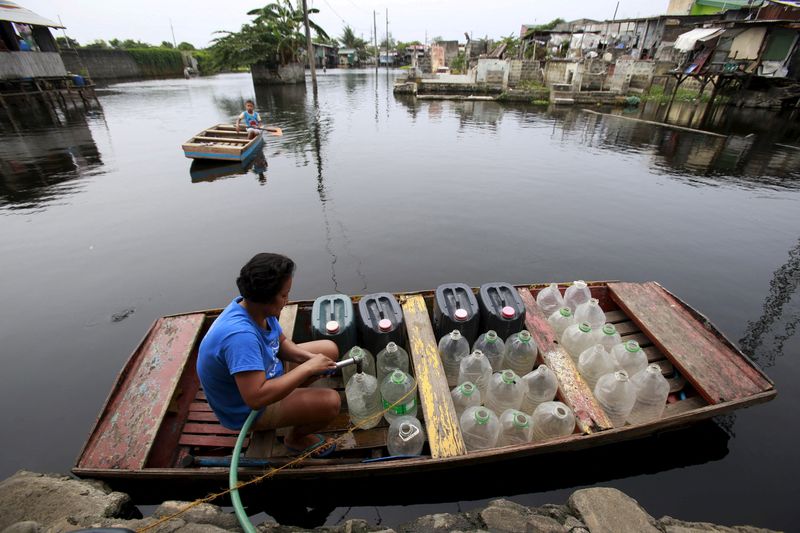Rising bottled water consumption signals safe drinking water goal is under threat, says U.N. think tank
2023.03.16 12:11

© Reuters. FILE PHOTO: A resident living in a flooded area refills plastic containers with drinking water on an improvised “banca” (small boat) in Artex compound, Malabon city, north of Manila, Philippines March 4, 2016. REUTERS/Romeo Ranoco/
By Gloria Dickie
(Reuters) – Surging global bottled water consumption reflects the failure by governments to improve public water supplies which is putting the U.N. sustainable development goal of safe drinking water by 2030 under threat, a U.N. academic think tank said on Thursday.
The bottled water market saw 73% growth from 2010 to 2020, and consumption is on track to increase from around 350 billion litres in 2021 to 460 billion litres by 2030, according to the U.N. University’s Institute for Water, Environment and Health.
“The rise in bottled water consumption reflects decades of limited progress in and many failures of public water supply systems,” the institute’s director Kaveh Madani said in statement.
The U.N. estimates that some 2.2 billion people do not have access to safe drinking water, with the number of people who had access growing by only 4% between 2016 and 2020.
Developing nations depend on bottled water to make up this shortfall. Egypt, facing water scarcity, was the fastest growing market for treated bottled water from 2018 to 2021, the UNU report said.
Singapore and Australia were the biggest per capita consumers of bottled water at 1,129 litres and 504 litres a year respectively, according to the report. Malaysia led developing countries in per capita consumption, at just under 150 litres.
More than a third of Americans said they use bottled water as their main water source, the report said.
“To a somewhat surprising extent, bottled water grew immensely over the last few decades while in the conventional and more reliable public and domestic drinking water supply, progress was slow paced,” said report co-author Vladimir Smakhtin of UNU-INWEH.
Meeting the UN sustainable development goal of providing safe drinking water by 2030 is therefore under threat, he said, noting governments were too often leaving the provision of safe drinking water to private actors.
ENVIRONMENTAL CONCERNS
In addition to concerns over poor access to clean drinking water, rising bottled water consumption also threatens the environment, ranging from concerns that corporations are depleting groundwater to plastic pollution.
The industry produced 600 billion plastic bottles in 2021, 85% of which are likely to end up in landfills.
“While there is growing awareness toward bottled water and plastic issues in the northern hemisphere … the market is not showing that,” said report co-author Zeineb Bouhlel. “It shows that campaigns run by corporations have a bigger influence on perceptions that bottled water is a better option.”
Research published last week found that plastics entering the ocean could nearly triple by 2040 if left unchecked.
“It is a human right to have access to free and clean water, but it’s also a right to live in a world free from plastic pollution,” said Marcus Eriksen, director of the 5 Gyres Institute, a plastic pollution non-profit.
(This story has been refiled to fix the typo in the headline)








